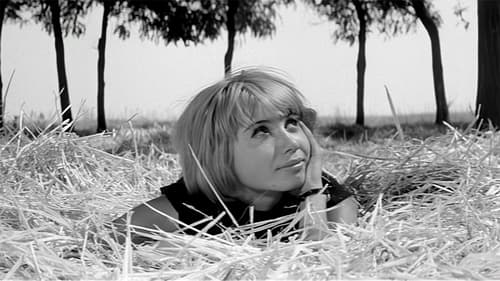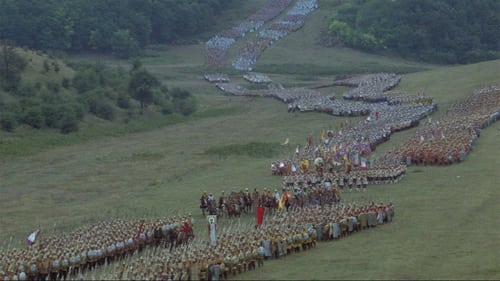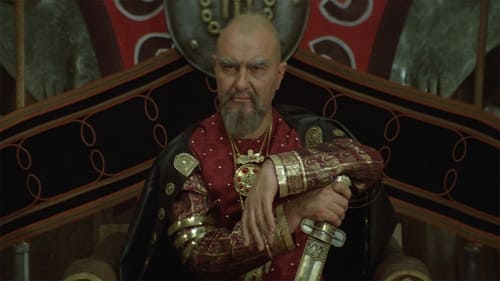
Frivolous girl falls in love with a young construction worker. He trusts her and decides to include her in his team of workers. In the beginning, she is happy, but soon starts to feel the tensions between the people in the team. Hypocrisy and demagogy fill her with indignation and she does not keep silent about the shortcomings and mistakes of her colleagues. Gradually, her superiors become uneasy about her and the girl has to go. Her boyfriend offers her marriage, but she decides to take her own path and lead a worthy life. The movie was shot in 1966 but was censored by the communist government and released in theatres on 31st October 1988.

Molla Sulfikar Softa
In the 17th century, a Bulgarian Christian region is selected by the Ottoman rulers to serve as an example of conversion to Islam. A Janissary who was kidnapped from the village as a boy is sent to force the reluctant inhabitants to convert. The Turkish governor seeks a peaceful solution, but ultimately torture, violence, and rebellion break out.

Elin Pelin
A story about the struggle to save Bulgarian Jews during World War II

Stareyshinata ha kuptzite
Knyaz Boris I reached the most important spiritual insight - the country needed a single language and script. It accepts students of Cyril and Methodius, creating Ohrid and Preslav Literary School. What other nations took centuries, for bulgarians takes place only about 20 years after their baptizing - introduced a Slavonic Alphabet.

Stareyshinata ha kuptzite
The picture features the life and deeds of Boris I - strong historic personality, which completes his mission to the full and at the end of his life receives holy orders. Prince Boris I is ruling in the late 9th century. In his youth, he, the brilliant statesman and diplomat, is experiencing heavy defeats in the wars he wages against his neighbors. Nonetheless, he manages not to cede any territories to the enemies. Under his rule, Bulgaria breaks with paganism and joins the Christian community, paying an exorbitant price, a heavy death toll, but there is no other way. The adoption of Christianity in 864 was a historical event of great significance. It guaranteed Boris I much need peace with the Eastern Roman Empire and allowed him to merge the numerous tribes inhabiting the country into a unified nationality and later to found a state. Boris I introduced the Slav script, thus turning Bulgaria into the cradle of Slav culture.

발레 공연에서 프리마돈나 역을 간절히 원하는 발레리나가 있다. 아무리 노력해도 기회를 갖지 못해 절망하던 그녀는 '백조의 호수'에서 '오데트' 역을 맡게 되면서 희망을 찾는다. 진정한 예술에 대한 고민과 성찰이 담겨있는 영화.

Fotografat
Velko, Filip, Pavel and Gosho have different professions but are connected by the love they have for music. They rehearse all year to make it big on the sea resorts in the summer. The head of the cultural center where they play is willing to give them the musical equipment if they replace their singer Maria (Filip's girlfriend) with the attractive but untalented Reni. This is the first, but not the last compromise they have to make on the way to the dream.

General Mihov
The action takes part from August 26 to September 9,1944 - the last days of the fascist regime in Bulgaria. At that time, following a decision made by the Central Committee of the Bulgarian Communist Party, all-out preparations for an uprising are under way. The central characters are real historical figures representing two antagonistic camps. The film chronicles a series of dramatic events: secret underground meetings, actions of the combat groups and the partisans, strikes and mass rallies, the last attempts of the regime to hold on to power. The film recreates the atmosphere on the eve of the uprising, which culminated in the main thrust: the seizure of the Defense Ministry in Sofia on the night before September 9.

The last part of the epic "Khan Asparukh" - "Land Forever" is an impressive finish to scale narrative, created for the nationwide celebration of 13 century anniversary of the Bulgarian state. The authors collected in final chord all storylines, culminating in the political strengthening of the young Bulgarian state. In the center of the film epic again is the image of Khan Asparukh - a lofty romantic hero who embodies the virtues and energy of his people.

This is an epic screen presentation showing the creation, the consolidation and the power of First Bulgarian Kingdom and the first Bulgarian ruler Khan Asparuh. The second part of the great historical epic - "The Migration" - tells about the long journey to the land of the Bulgarians of today's Bulgaria. Here the young Khan Asparukh laid the foundations of the new state. The authors adhere to the established historical versions for this event. The film builds on the impressive mass scenes and the convincing served psychological characteristics of the main characters. The image of Asparoukh is a natural center of the story, in which many minor persons recreate the environment of the Khan. Romantic exalted, Asparukh is shown as capable leader of the people, consistently implement his own ideas.

This is an epic screen presentation showing the creation, the consolidation and the power of First Bulgarian Kingdom and the first Bulgarian ruler Khan Asparuh. This is the first part of the film trilogy about the events before the creation of the Bulgarian state in the middle of the VII century. Volga Bulgaria is straining under the attacks of the Khazars. Following the testament of his father, the sons of Khan Kubrat looking for a new home for their tribes. The youngest of them - Asparukh, wander 20 years in search of "land forever" for his people and reaches the mouth of the Danube. The film is narrated by captured Byzantine chronicler Belisarius, which should Asparukh in his journeys. Byzantine witnessed the heroic efforts of the Bulgarians to win the land south of the Danube and to create their new country.

Dosadnik
A couple of young ladies decide to obtain a driving license. The film is a true comedy of relations, caused between the driving-teacher and the beginner-drivers.

Research-worker
Denev is a specialist in his area. and has no time to write his dissertation. His cousin Ivan offers his help to switch places wich leeds to catostrophe.

Maria, a beautiful middle-aged woman, former participant in the fight against Nazism is killed. The investigator Urumov discovers the criminal. Urumov wants to know the reason why Dzherikarov has committed the murder. Dzherikarov is a former officer of the king army. Maria's memories expose the fact that she has arrested his commander in the past. By killing Maria, he wants to save his understanding of "officer's honor". Urumov sees that Maria's daughter leaves at the mother's grave an apple. In order to save her illusion, he eats the apple every time. In final talk with Dzherikarov, the murderer condemns himself to death and eats the apple.

Nedev
A common Bulgarian family spends a warm afternoon in the fall in a country house. The preparations for a dinner party are in full swing. The formal reason is that the son enlists in the Army and the real reason is to arrange a match between him and the daughter of the boss. All the schemes are frustrated as it turns out that the boy has already married another girl. Both the hosts and the guests lose control, unleashing a consecution of tragic or comic situations.

medical auxiliary
The beginning of the 20th century. The young Nona comes back to her father's farm from Switzerland. She meets colonel Galchev. The officer expresses his love for her. The teacher Yosif who is in love with Nona organizes a revolt of the villagers with no property. Armed villagers rob the farm. Galchev and his soldiers arrive. During the shooting, the colonel is killed. Nona accuses Yosif of Galchev's death. The carriage of Nona's fiancé, who travels from Switzerland to the village, passes by the coffin with Galchev's body. A second after the fiancé enters her house Nona kills herself.

In the House of Marriages, the young couples are paraded one after other. The newlyweds sign the register, kiss and receive congratulations. The picture fades out and another house takes shape: house of executions. An antifascist resister condemned to die marries his beloved minutes before facing the firing squad.

The militia boss
A classic noir murder mystery based on the same name detective book by Bogomil Raynov

1944. The inhabitants of the house are strange. On the first floor is the owner - the lawyer. He expects as a close man to the government to enter the big politics soon. On the second floor resides a pro-Nazi doctor. There is an illegal printing press at the attic. Every day brings new challenges to the illegal printers. The lawyer decides to travel for the country. This distorts the plans of the illegal printers because they must move too. They meet the sunrise with a smile. Every day is joy to them - the fact that they are alive and they can continue their work.

















